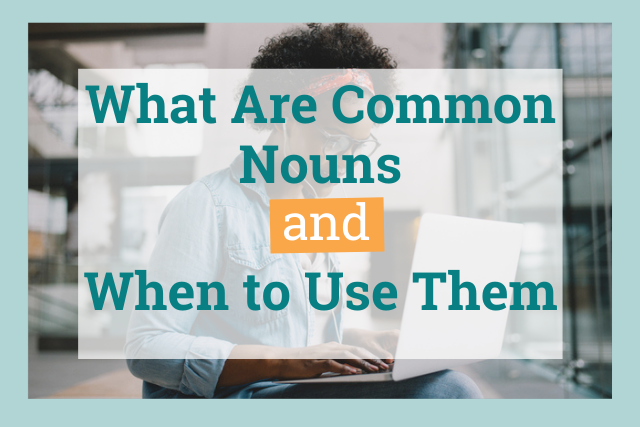
A common noun is a noun that may refer to a general or specific class or entity and can be used with limiting modifiers such as a, an, my, every, and some. A common noun is always written in lowercase.
The English language is full of confusing rules and exceptions to those rules so let’s scale it back for a moment to make this easier to understand.
What is a Noun?
The noun—one of the most essential elements of the English language—makes up the largest class of words in this and most other languages as well. It can refer to a thing, a person, an animal, a place, a quality, an idea, or an action.
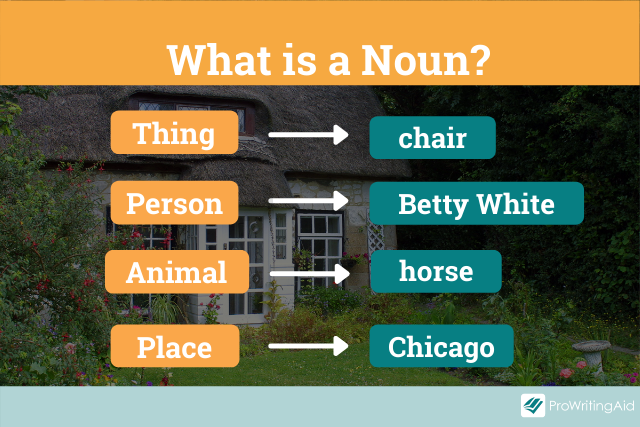
A noun is usually a single word (for example, book) but that's not always the case. Bathtub, fish cake, and swimming pool are also nouns. Specifically, they are compound nouns—they are made up of two or more nouns to form an altogether new one.
What is a Common Noun?
A common noun is just like a regular noun—it's still a person, place, thing, etc. But in this case it refers to a generic class of beings, places, or things. Generic here simply means that we don’t have any specific information on the precise nature of our noun.

So, for example, the following are all common nouns: city, child, and book. If we used common nouns in a sentence, it would read something like this:
- The child went into the city to buy a book.
We have a complete sentence here with a subject (noun) performing an action (verb). But we don’t actually have a lot of detail. Who is the child? What city is she going to? Which book does she buy? This is where our proper nouns come in.
Here are 20 examples of common nouns:
| street park neighborhood district city country continent |
religion language sect nation tribe institution authority |
restaurant fashion brand sport book album TV show |
|---|
What is a Proper Noun?
Unlike common nouns, proper nouns are a particular person, place, or thing. Proper nouns do not take a limiting modifier (a, an, every, some) and are usually capitalized.
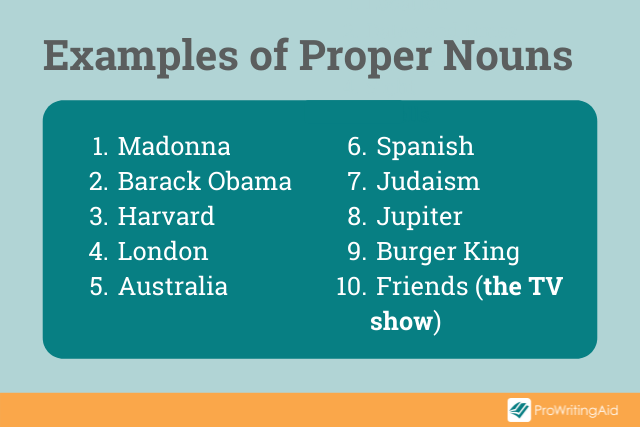
Remember our sample sentence from above? We didn’t get a lot of specifics with it.
Now, examine the following sentence:
- Madeline went into New York City to buy a copy of Where the Wild Things Are.
In essence, we did not change the structure of the sentence. We simply replaced all of the common nouns with proper nouns. And there you have it, we now have specific details that give us a better picture of the action.
Also, note that all the proper nouns are capitalized while none of the common nouns were.
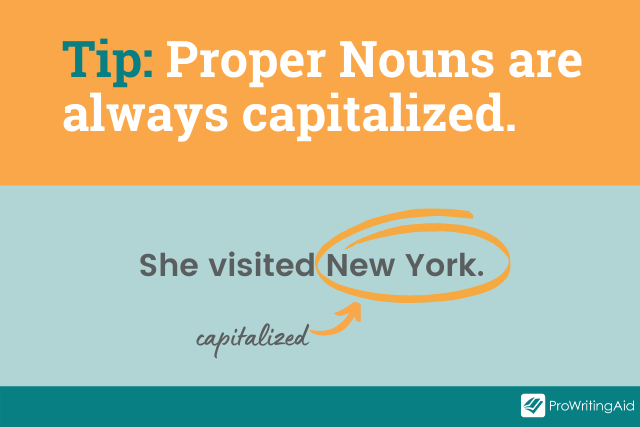
Common Nouns vs. Proper Nouns
While common nouns provide us with general classifications only, proper nouns provide precise details. Each common noun will always have a counterpart, as we’ve just seen in the most recent example.
Child, city, and book were replaced with their specific proper nouns of Madeline, New York City, and Where the Wild Things Are.
So, to repeat, proper nouns can always be linked to a more generic common noun.
| COMMON NOUNS | PROPER NOUNS |
|---|---|
| academic institutions | Ivy League |
| mountain range | Himalayas |
| month | October |
| language | Spanish |
| district | SoHo |
| religion | Islam |
| government institution | Congress |
| person | Dolly Parton |
| sports brand | Nike |
| superhero | Spider-Man |
However, not all common nouns will necessarily have a proper noun to go with them (think of toe, hair, dust, dirt, etc.).
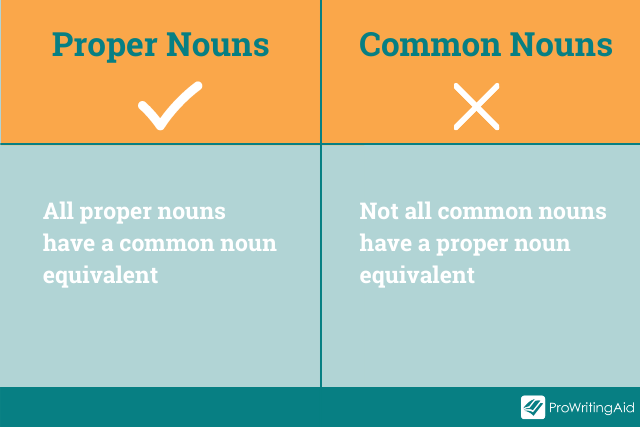
The main reason for distinguishing between common nouns and proper nouns is to help with classification and capitalization.
While proper nouns are almost always capitalized, common nouns never are.
While proper nouns indicate a specific class or entity, common nouns provide a generic designation.
How to Spot a Common Noun
As pointed out at the start of this article, an easy way to spot common nouns is by working out whether we can use any limiting modifiers with them, such as a, an, my, every, or some and making sure it’s lowercase. For example:
- Paul threw his book against the wall.
- Paul threw Hamlet against the wall.
In the first example, his can be replaced with a and the sentence still reads correctly, so "book" is a common noun.
In the second example, Hamlet is both capitalized and cannot be replaced by any of the modifiers (there's only the one Hamlet after all), so we know that this is a proper noun.
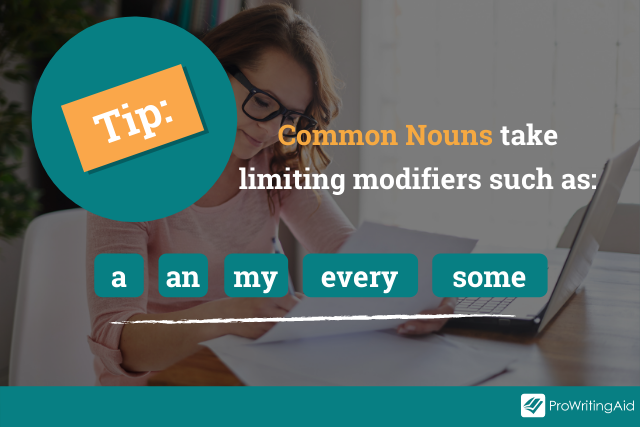
How to Spot a Proper Noun
Now this is relatively easy because proper nouns are almost always capitalized. For most of us it’s already second nature to capitalize names of companies, people, languages, countries, etc.
I say almost because, true to its tricky nature, English will always have an exception to confuse you. Sometimes you will find that certain proper nouns can be written in lowercase, such as mars (the planet, not the chocolate bar).
Technically, it is a specific planet—i.e. a proper noun—and should therefore be capitalized. But as its use is so ubiquitous in the English language, the lowercase spelling has become widely accepted.
Another example of this is champagne (the drink, not the region). Because it’s now such a familiar designation for most sparkling white wines, it is commonly accepted as lowercase.
In these instances it is often down to a particular house-style whether a specific proper noun needs to be capitalized or not. So check your style-guide before making a judgment call.
Why Do We Need Common Nouns?
Common nouns are used no differently in writing and speech than any other type of noun. They take the same grammatical positions and can thus be used as subjects and direct or indirect objects.
Take a look at these examples:
- The book fell on the floor.
Book is the common noun used as the subject of the sentence.
- Paula threw the book at the wall.
Book is the common noun used as the direct object of the sentence.
- Paula spilled some water on her book.
Book is the common noun used as the indirect object of the sentence.
Using different types of nouns can help keep our writing varied, fresh, and more precise. Sometimes we want to be more specific, sometimes a little less.
Do you want to paint a vivid, precise picture for your readers? Use a proper noun. Are you interested in setting a more general scene without getting lost in details? Then perhaps a common noun is more appropriate.
The more types of nouns we use in our writing, the more engaging and interesting our text becomes.
Common Mistakes with Common Nouns
A common mistake made when using common nouns is to capitalize them, especially when it comes to titles and professions. Words such as president, chancellor, or queen sound important, so people tend to capitalize them incorrectly.
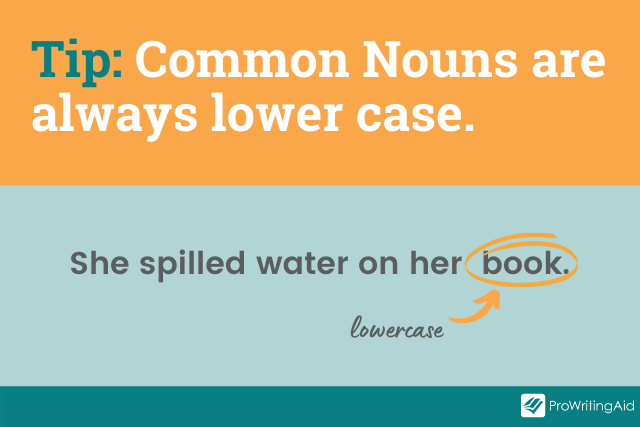
A simple way of avoiding that mistake is to look carefully at your noun. Is it specific? Is it talking about one particular person, thing, place, etc.? If not, then keep it lowercase.
Let’s look at some examples:
- The president of the United States is the head of state.
We are not talking about a specific president, such as Joe Biden, so “president”, despite its gravitas, remains lowercase.
If we wanted to capitalize the word “president”, we’d have to turn it into a proper noun. To do so, all we have to do is attach it to the name of the president. So, for example:
- The current head of state is President Joe Biden.
Let’s look at one more example to let it sink in.
- The queen is currently residing in her summer palace.
Again, we have no specifics as to which queen we are talking about or where she might be staying. These are generic terms only, so we have to keep them lowercase. If we wanted to capitalize them, we’d have to turn them into proper nouns. For example:
- Queen Elizabeth II is currently residing at Balmoral Castle.
Now we have specifics—we know which queen we’re talking about and the name of the specific castle.
If you find yourself using the same common nouns throughout your writing, the ProWritingAid Thesaurus check is a great tool to help you find the perfect words. Sign up for a free ProWriting Aid account today and see for yourself.
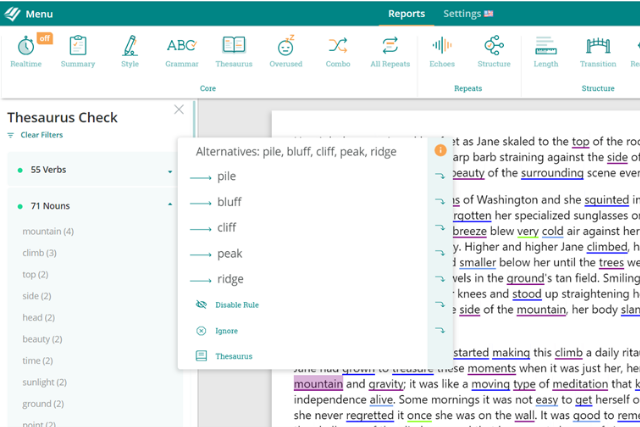
Test Yourself
Now it's time to practice what you've learned. Let’s look at the examples below. Highlight all instances of common nouns and underline the proper nouns.
There’s nothing I’d rather do than sit here and look at the stars with you.
Google is a company renowned for its work-culture.
Pandora’s Box is a well-known myth.
The Cherokee are one of the indigenous people of the United States of America.
The Ford Model T was one of the first affordable cars.
Test Answers
There’s nothing I’d rather do than sit here and look at the stars with you.
- Stars is a generic term used for the astronomical objects we can see in the night sky. It does not refer to a specific star, for example Vega, or a star-formation, such as Orion’s Belt.
Google is a company renowned for its work-culture.
- Google is the name of the company we’re talking about here, so we have both the common noun with its proper noun equivalent. (Work-culture is a compound noun, if you want to get nit-picky here.)
Pandora’s Box is a well-known myth.
- There are many myths in Greek mythology, but only one story about Pandora.
The Cherokee are one of the indigenous people of the United States of America.
- There are many indigenous people in the USA, so this is a generic term, while the Cherokee are one particular tribe of note.
The Ford Model T was one of the first affordable cars.
- I bet you’re getting the hang of these now, right? Cars is the generic term for automobiles, while the Ford Model T speaks of one particular model and make.
A Quick Common Noun Recap
Common nouns are generic (think non-specific) people, places, things, ideas, animals, actions, or qualities. Use them to create a general scene without going into details.
They're always lowercase and function just like any other type of noun in your writing.
If you’re unsure whether you’re looking at a common noun, check its capitalization and try using it with a limiting modifier. If it’s general, lowercase, and you can use one of those modifiers, chances are you’re looking at a common noun.


